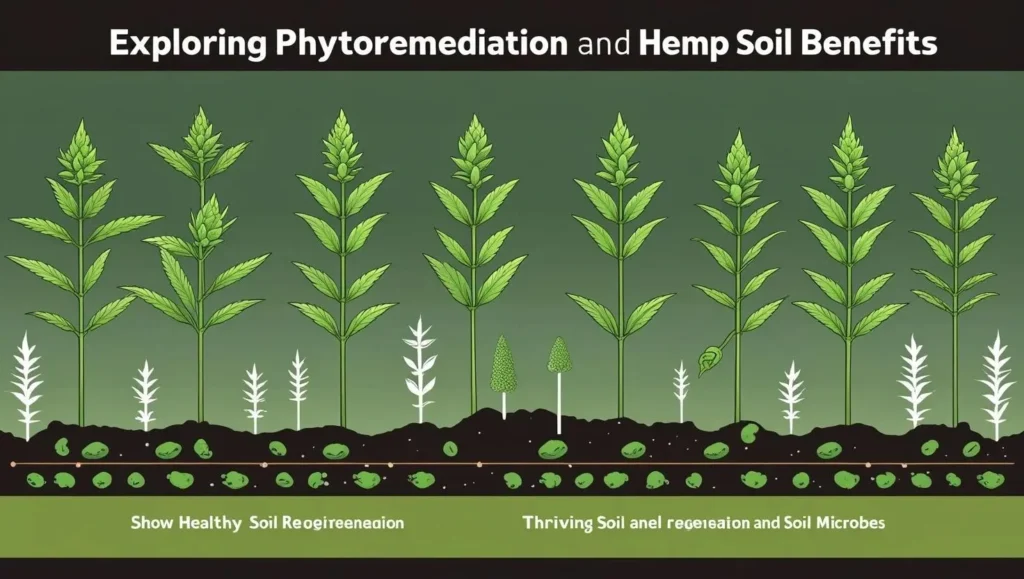Hemp is a plant in the botanical class and belongs to the family of cannabis sativa, which has multiple uses, from edible fiber, cloth, and construction material. Hemp is a crucial plant that holds great importance in terms of usability and technical aspects. Hemp is largely cultivated in advanced cultivation, and as cover cropping to preserve the hemp soil benefits and replenish it over time. Hemp soil benefits is a large aspect of the prevalent ecosystem.
Industrial hemp is an effective mechanism in improving soil health and soil remediation. The process is known as phytoremediation, which absorbs and stores harmful contamination like heavy metals, pesticides, and radioactive elements.
Industrial hemp acts as an effective methodology in soil remediation through the phytoremediation process of phytoremediation.
You Can Read Also: Drones technology in Hemp farming
Hemp in the phytoremediation process
Phytoremediation is a process that uses plants to clean polluted sites. It is the method of cleaning up or taking up the pollutants in the plant tissues. Which involves the sequestration process it revitalizes the ecosystem.
Phytoremediation is an environmentally viable option to remove toxins and contaminants from polluted sites.
The conventional method uses surface digging and removal, and land farming. The process of phytoremediation begins by re-establishing the ecosystem by stabilizing the soil and stimulating the microbial activity. Which restores the ecosystem and encourages and replenishes the natural flora and fauna.
The crucial species of plant which is thriving in the field of phytoremediation is hemp, cannabis sativa. Hemp has the potential and capability to phytomediate the pollutant. Phytothermediation works best when the whole ecosystem is considered. In Canada, hemp was considered to break down petroleum hydrocarbons in contaminated soil with gradual improvement in the life cycle.
Hemp was found to tolerate and reduce salt levels and excessive nutrients, improving the soil health and microbial activity in the growing seasons.
Hemp improves soil health
Hemp enhances and improves soil health through its deeply penetrating roots, which support the beneficial microbes and prevent erosion.
Through the process of cover cropping and crop rotation, hemp supports nutrient cycling and prevents erosion. The plant’s phytoremediation quality makes it more significant for cleaning the contaminated soil, its organic constituents and properties make it a significant soil, through its water retention capabilities and microbial activities.
As the global condition is dealing with the ongoing pressure on the environment challenges, a silent aspect in their era is hemp, a crop that is claimed as a game changer in this diverse atmosphere. It’s high time to explore sustainable solutions.
This versatility has a diversified effect on the health, from embracing the structure and fertility to increasing water retaining capacity.
Hemp’s strategy for environmental cleanup
Hemp soil benefits and its environmental positive consequences, which make it a powerhouse for maintaining sustenance in agricultural practices. It’s deeply rooted and penetrated deep into the soil it sequestering carbon 8-15 tons per hectare, and it prevents erosion using 75% less water than cotton. There is no need for pesticides, as the natural formulation creates an effective pest management system, reducing chemicals by 50-75%.
Its carbon sequestration capabilities have an exceptional potential for climate change mitigation. Through biochar production, hemp stalks. It can store carbon in soil indefinitely. And therefore aids in environmental cleanup.
Hemp’s role in sustainable agriculture
Hemp soil benefits the ecosystem as it’s a renewable resource that holds potential benefits in maintaining sustainable agriculture. On the other hand the conventional agriculture contributes to the climate crisis by causing deforestation, soil degradation, environmental pollution, and increased carbon emissions.
Sustainable agriculture, in contrast, combats the following impediments: the traditional concept of agriculture is still prevalent, as it resembles a sustainable agricultural format. A sustainable form of agriculture is both profitable and environmentally safe.
Whereas the hemp cultivation provides a wide range of benefits, which mainly include carbon sequestration. Hemp plays a key role in making agriculture more sustainable.
As a construction and fiber material, hemp can sequester carbon. Hemp farming stores and captures CO2 faster and better than the forest could ever do. Hemp is a deep-rooted crop that penetrates deep into the soil and prevents various plant diseases.
Restoring Hemp Soil Benefits
Industrial hemp is an effective and efficient tool for soil remediation by soil Here we refer to restoring the health of hemp farms, its process of replenishing the soil to its original state, in the implementation of various techniques and strategies to eliminate or reduce pollutants that may have accumulated in the soil over time. Hemp farmers can ensure optimum growing conditions for their crops while minimizing the negative impact of hemp cultivation.
FINAL THOUGHTS!
The application of soil remediation and different types of soil contamination is a great concern for farmers which aims to maintain healthy and productive crops. In recent development, the hemp crop is not less than a miracle with versatile usage, along with less water needed and soil-enriched cultivation.
But, as its connection with marijuana makes it difficult for widespread cultivation, there comes the restriction that one needs to adhere to the regulations and guidelines for its sustainable cultivation.
Soil degradation has become prevalent in the new era to combat this phenomenon, hemp plantations have become crucial in recent times. In this situation, hemp has emerged as a beacon of hope. This universal crop has been shown to have a profound impact on soil health, improving its structure and fertility, to increasing water holding capacity.

